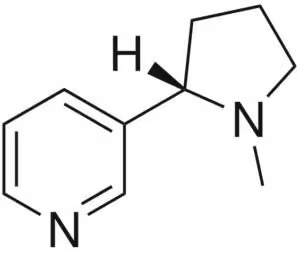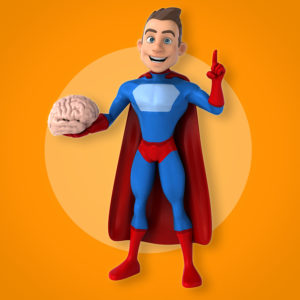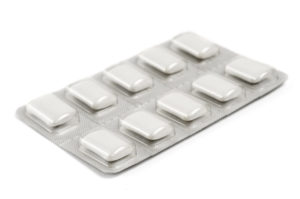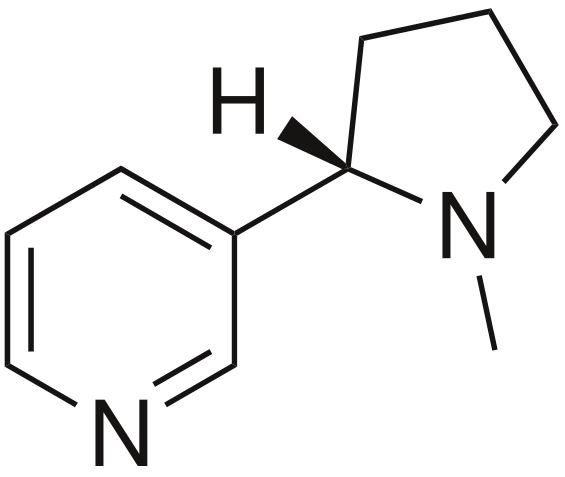Table of Contents
Click the image above or watch on YouTube
Key Takeaways
- Nicotine has been used for thousands of years for its nootropic properties such as improving concentration, memory, motivation, and mood.
- As a nootropic, nicotine is typically dosed at 1 – 2 mg
- Despite the cognitive benefits of nicotine, it is not recommended to smoke tobacco due to the harmful effects.
- Nicotine can be addictive and cause side effects like increased heart rate, high blood pressure, gastrointestinal problems, and it may promote tumor growth, so its use requires caution.
Nicotine (3-(1-Methyl-2-pyrrolidinyl) pyridine) is an alkaloid found in tobacco leaves. And has been used by humans for its psychoactive (nootropic) properties for thousands of years.
But it is only in the last several decades that nicotine’s mechanism of action in the brain has been revealed.
Nicotine works primarily by upregulating nicotinic acetylcholine receptors (nAChR) in the brain. Increasing neural signaling of neurotransmitters and boosting alertness, cognition and memory.
Studies have shown however that this upregulation of nAChR is dose dependent. And too much nicotine desensitizes these receptors.[i] So low doses of nicotine are key in using nicotine as a nootropic for cognitive benefit.
Since we’re investigating nicotine as a nootropic here, it’s important to point out that I am not encouraging smoking. Smoking tobacco has been shown to increase cognition.
But the harmful effects of tobacco have been proven extensively.[ii] Including this study that showed life-time smokers have less gray matter in the prefrontal cortex compared to non-smokers. Affecting the brain’s reward, impulse control and decision-making circuits.[iii]
Nicotine as a nootropic helps:
- Memory. Nicotine improves short and long-term memory. Nicotine affects nicotinic receptors which increases the use of neurotransmitters that helps with memory formation. And induces long-term potentiation which helps encode long-term memories.
- Neurotransmitters. Nicotine binds to nicotinic acetylcholine receptors in the brain. Boosting the release of acetylcholine (ACh), dopamine, serotonin, and glutamate. Affecting alertness[iv], attention, cognition, memory and mood.
- Brain Optimization. Nicotine modulates the connectivity and structure of brain networks. And improves whole-brain communication efficiency. Boosting overall cognitive and brain function.[v]
Overview
Nicotine (3-(1-Methyl-2-pyrrolidinyl) pyridine) is an alkaloid found most famously in tobacco leaves. But nicotine is also present in very small amounts in plants from the Solanaceae or nightshade family including potatoes, tomatoes and eggplant.[vi]

Nicotine acts on acetylcholine (ACh) receptors in your brain. Stimulating and regulating the release of a host of neurotransmitters including serotonin, dopamine and norepinephrine.
New drugs derived from nicotine and the research on nicotinic receptors are in clinical trials for Alzheimer’s, ADHD, anger management, anxiety, depression, schizophrenia, Tourette Syndrome and wound healing.[vii]
As a nootropic, we’re talking about using a nicotine lozenge or gum for cognitive function enhancement. I am NOT talking about smoking tobacco.
Smoking is the cause of 5 – 6 million deaths per year. Affecting 18 different organs in your body. But it’s not the nicotine in tobacco that kills.
The biggest issue with using nicotine as a nootropic is that it can be addictive. But it’s not the nicotine that causes cancer. Nicotine however could be a “tumor promoter”.
Nicotine binds specifically to the nicotinic acetylcholine receptor (nAChR) in your brain. And it deregulates essential processes like regulation of cell proliferation, apoptosis (programmed cell death), migration, invasion, angiogenesis, inflammation and cell-mediated immunity of stem cells, adult tissues and cancer cells.[viii]
As a nootropic, taking nicotine in smalls doses (i.e. 1-2 mg) and used occasionally helps when you need that cognitive boost. If you have cancer or a tendency to tumor growth you should avoid using nicotine.
How does Nicotine work in the Brain?
Nicotine boosts brain health and cognitive function in several ways. But two in particular stand out.
- Nicotine boosts memory. Nicotine binds to presynaptic nicotinic acetylcholine receptors in the brain. And boosts the release of acetylcholine (ACh), dopamine, serotonin, and glutamate.[ix] Neurotransmitters known to be involved in cognitive processes.
Problems with cholinergic signaling has been implicated in neurologic disorders including schizophrenia, ADHD and addiction. And much of the study of nicotine’s effects on cognition has been done looking for treatments for these disorders.[x]
The National Institute of Drug Abuse conducted a meta-analysis of 41 double-blind, placebo-controlled studies between 1994 and 2008. The analysis found significant positive effects of nicotine on fine motor performance, alertness, attention and accuracy, response time, short-term and working memory.[xi]
- Nicotine improves attention. Attention deficits are often associated with those dealing with ADHD. The inability to focus can cause all kinds of problems both in relationships, and on the job.
Nicotine has been shown to improve attentiveness in smokers. And helps alleviate attention deficits in Alzheimer’s Disease, schizophrenics and adults with ADHD.
A double-blind study conducted at Duke University Medical Center used nicotine patches to see if it would improve attentiveness in non-smoking adults without attention deficits. Subjects received 7 mg of nicotine per day using a transdermal patch for a 4 ½ hour morning session.
Nicotine significantly decreased the number of omission errors during testing. And in this study, decreased the variance in “hit reaction time” which is used a measure of attentiveness.
The study showed that nicotine reduced attention deficit, and even improved attentiveness in normal adult non-smokers.[xii]
How things go bad
As we get older, our brain chemistry and energy metabolism changes.[xiii]
↓ Acetylcholine signaling in the brain declines
↓ Dopamine, norepinephrine, epinephrine and serotonin levels decline
↓ Alertness, attention and memory declines
↑ Anxiety, depression and stress increases
All of these age-related changes are contributing factors to the neurodegenerative diseases of aging, including Alzheimer’s and dementia.
Nicotine benefits
Nicotine boosts levels of dopamine, epinephrine (adrenaline), norepinephrine and serotonin. And human cell lines in test tube studies as well as animal studies show nicotine stimulates the growth of new blood vessels. Even increasing the number of red blood cells.
Nicotine rapidly crosses the blood-brain barrier. Within 20 seconds of putting a nicotine lozenge under your tongue. It has the fastest action of any nootropic I have reviewed here on Nootropics Expert.
Alpha brain waves increase with nicotine which provides a relaxed state associated with super-learning, flow states and joy.[xiv]
Nicotine stimulates electrical and neurotransmitter activity throughout your brain. Helping alertness, mood, motivation, selective attention, sustained attention, and decreases distraction.[xv]
Nicotine helps pre-attentional processing which is your ability to detect information. It brings you down when you’re up. And it brings you up when you’re down. And it helps you cope with stress and anxiety.
And nicotine improves short-, long-, and working memory processes.[xvi]
How does Nicotine feel?
Neurohackers report nicotine improves mental clarity and motivation. Mood swings are minimized and less anxiety.
Concentration and focus significantly get a boost with nicotine as a nootropic.
All forms of memory get a boost with nicotine. Short and long-term memory. And working memory. Nicotine induces long-term potentiation in the hippocampus which is the basis for the neuroplasticity that helps encode long-term memory.[xvii]
The key with nicotine is to use low doses. And only use it occasionally. Too much nicotine desensitizes the alpha-7 nicotinic acetylcholine receptor. So tolerance is an issue. But your receptors recover fairly quickly if you give them a break for a day.
Nicotine Clinical Research
Much of the research conducted with nicotine was done with cigarette smokers. The studies were to determine the effects of abstinence (quitting smoking) on cognition. Or funded by tobacco companies out to prove smoking was good for you (i.e. improved cognition). Cigarette smoke is harmful.
So keep an open mind when reviewing these studies. My intent is certainly not to encourage smoking. But to show the effects of nicotine regardless of the delivery system to the human brain.
Nicotine boosts IQ
Researchers in New Zealand conducted a trial with 10 women and 6 men ranging in age from 18 – 32 years. All participants were smokers and were instructed not to smoke during the 2-hour period prior to the experiment.
Each subject completed the even and odd numbers of the Raven’s Advanced Progressive Matrices (APM) test in two sessions. APM is a test to measure intelligence (IQ).
In each of 2 experimental sessions, subjects were given 20 minutes to complete the assigned half of the APM. Before beginning the test, subjects took 6 puffs of a medium (0.8 mg) cigarette every 20 seconds. After 10 minutes, subjects were prompted to take 2 additional puffs.
Results of the experiment showed that APM scores were significantly higher in the smoking session compared to the non-smoking session. Suggesting that nicotine acts to enhance intelligence.[xviii]
Another study at the University of Colorado may explain part of this boost in IQ. Nicotine was found to increase the efficiency of neural communication between areas of the brain involved in cognition. And even the rest of the brain.[xix]
Nicotine improves typing speed
 Researchers conducted 5 experiments to study the effects of using 2 mg of nicotine on keyboard typing speed. In study after study nicotine produced a reliably consistent increase in typing speed.[xx]
Researchers conducted 5 experiments to study the effects of using 2 mg of nicotine on keyboard typing speed. In study after study nicotine produced a reliably consistent increase in typing speed.[xx]
Nicotine will also improve and increase the speed of your handwriting. Scientists in Germany noted that nicotine has consistently been shown to improve psychomotor performance. So they recruited 38 smokers and 38 non-smokers to participate in a study.
Both groups received gum containing 0, 2 or 4 mg of nicotine. And their handwriting performance was assessed after they chewed the nicotine gum. Subjects were asked to perform a simple writing task. Movement time, velocity and acceleration of handwriting movements were measured.
Nicotine reduced movement times, increased writing velocity and more fluid handwriting movements were observed. The results suggested that nicotine can enhance psychomotor performance to a significant degree in a real-lie motor task.[xxi]
Nicotine boosts memory
Nicotine has been shown to improve short-term and working memory in several studies. In this study conducted in the UK, researchers recruited 60 smokers and 60 non-smokers in a double-blind procedure.
Half of the subjects chewed nicotine gum and the other half chewed a placebo prior to performing a memory task. Results showed that nicotine significantly improves short-term memory.[xxii]
Nicotine for the treatment of ADHD
Several studies have shown the benefits of nicotine in treating the symptoms of ADHD. Focusing and memory break down in those of us with ADHD and ADD. And treatment with Ritalin, Adderall or other stimulants often corrects this inattentiveness and memory impairment. But it does nothing for the accompanying depression and anxiety.
And this is the reason many Adult ADHD sufferers smoke. This study showed that using a nicotine patch not only helped decrease anxiety and depression symptoms of ADHD. It also helped smokers stop using tobacco products while taking care of their ADHD symptoms.[xxiii]
In this study, nicotine was compared to the effects Ritalin and or a placebo had in treating ADHD. Nicotine improved performance and reduced errors. It decreased depression, and decreased overall severity of ADHD symptoms.[xxiv]
Another double-blind, placebo-controlled trial worked with 6 smokers and 11 nonsmokers with Adult ADHD. Nicotine decreased ADHD symptoms, increased vigor, and improved reaction time.[xxv]
Nicotine Recommended Dosage
Nicotine as a nootropic is dosed at 1 – 2 mg on an as needed basis.
Nicotine gum typically comes in 2 – 4 mg. You can cut a 4 mg piece of gum in half for a 2 mg dose. Gum releases the nicotine dose over the course of 20 – 30 minutes.
The problem with nicotine gum is aspartame along with other unhealthy sweeteners.
Nicotine patches come in varying strengths and usually contain more nicotine than gum or lozenges. Neurohackers (contrary to package warnings) cut the patch to size depending on the dose they want to use.
My preferred method is nicotine lozenges. Mini-lozenges are best because they’re not full of toxic chemicals like larger lozenges. The 2 mg mini-lozenge cut in half provides cognitive benefits within 10 – 20 minutes.
Nicotine Addiction & Other Side Effects
Nicotine is addictive primarily because it boosts levels of dopamine in your brain.[xxvi] Not nearly as addictive as smoking tobacco or chewing tobacco but addictive nonetheless.
Nicotine can cause increased heart rate, high blood pressure, dizziness, cough, sneezing, sinus problems, upset stomach, constipation, and headaches.
Nicotine does not “cause” cancer. But may be a tumor promoter. So if you had or currently have cancer you should avoid nicotine.
If you are dealing with a gut infection of H pylori bacteria, you should not use nicotine until you get this problem under control.
Type of Nicotine to buy
Nicotine used as a nootropic comes in gum, inhalers, lozenges, and transdermal nicotine patches.
See “Nicotine Recommended Dosage” for specific dosing instructions.
Nicotine Gum & Lozenges
Mini-lozenges are the safest and best form for nootropic use. I have tried and recommend the nicotine lozenges or gum by Lucy Nicotine. Lucy uses pharmaceutical grade nicotine and natural ingredients only in their lozenges and gum. Check them out here: Lucy.co Nicotine.
Nicotine Spray
Nicotine spray is a newer option you may want to try. You get a 1 mg dose for each spray under your tongue (sublingually). Great for a quick cognitive boost and burst of energy. There’s about 100 sprays in each container.
Nicotine Vaping
Vaping is another option. But it can come with a host of potential issues if you’re not familiar with vaping. The safest option is rebuildable coils using stainless steel wire and organic cotton with vegetable glycerin as your nicotine base. And keeping the temperature low and power less than 4 volts.
Of course there is also cigarette smoking and chewing tobacco for your nicotine dose which I DO NOT recommend.
Nootropics Expert Recommendation
Nicotine 1 – 2 mg per dose
 I recommend using Nicotine as a nootropic supplement.
I recommend using Nicotine as a nootropic supplement.
Your body does not make nicotine on its own. So if you are going to supplement with nicotine, you must take it as a supplement.
Nicotine is helpful for those dealing with short-, long-term and working memory problems, low energy, depression or anxiety.
Nicotine is especially helpful for dealing with the symptoms of Adult ADHD. Nicotine can help relieve many of the symptoms of ADHD. And is a good compliment to your existing ADHD meds.
While nicotine is a powerful cognitive enhancer, it is also addictive and can lead to tolerance and withdrawal symptoms in some people. So caution is advised. And if you’re prone to addiction please stay away from nicotine as it can lead to nicotine addiction.
As neurohackers, we have great acetylcholine agonists available to us if you don’t want to experiment with nicotine. Most of the racetams will boost acetylcholine use in the brain.
We suggest starting with a dose of ½ – 1 mg of nicotine in mini-lozenge or spray form. Nicotine will compliment nearly everything in your current nootropic stack.
There is no benefit to dosing more than 2 mg of nicotine for cognitive benefit. And too avoid addiction and tolerance we suggest only using nicotine occasionally.
Lucy.co for example sells nicotine 4mg lozenges. Use a pill splitter and cut them in half for a 2 mg nootropic dose.










Join The Discussion - 119 comments
Henry
April 10, 2021
Hello David, does nicotine have any affect on GABA? Thank you.
David Tomen
April 16, 2021
Henry, nicotine indirectly affects GABA. Nicotine boosts the release of glutamate which goes on to make GABA in step within the glutamine/glutamate/GABA Cycle.
Henry
April 16, 2021
Much appreciated, David, as always.
Laury
March 22, 2021
Hello David,
Thank you for your explanation.
I don’t want to use nicotine, but I have great results with it.
What nootropics are similar in terms of mechanism?
Thanks for the help.
David Tomen
March 23, 2021
Laury, nicotine stands on its own re. mechanism of action. It’s unique and there is nothing to compare it to.
Kent
March 17, 2021
Recently started taking 1/2 tab (1mg) of the nicorette “tic-tacs” 1-2x\ day. I get it = ) Thanks for the affirmation. Keep up the good work.
David Tomen
March 18, 2021
Thanks Kent.
James
July 7, 2020
After reading about Nicotine and treating depression I have take 4mg mints (cut in 1/2) once or twice a day (some days I skip).
I can tell when I take it, I come out of a down mood, more focused and overall just feel better.
Mark
April 12, 2020
This is something I have intimate and extensive experience with. I was a smoker for 20 years. I quit smoking and tried the patch but dropped it because it’s a PITA in summer if you sweat alot- I do. The patch also interfered with my sleep and I already have issues with insomnia. The gum is tricky regarding how much and how often you chew and doesn’t seem to last long.
The lozenges and vape is the route I take. They’re fairly inexpensive if you buy them at Walmart or Target (USA for folks elsewhere). I’ve been using 4 mg mint lozenges since 2012 and have not experienced tolerance issues. I use around 5 bottles per month and pretty much unchanged over the years. As for the vape, the main issue is overheating. If you overheat the vape, it tastes horrendous like when you smoke a cigarette down to the filter. So unless you’re wasted when you vape, it’s a negative feedback loop- you only make that mistake once.
As for the dosage. I smoked a pack and a half for 20 years so my tolerance may be higher. I can get by on 2 mg but function well on 4 mg. I work in R&D in STEM so I need to possess lightning fast cognitive skills. Believe me, it amplifies my 130 IQ such that I can compete with someone 10-15 IQ points higher.
As a final note on carcenogenesis, most former smokers should think carefully on that. In my soul searching, I believe the risk-benefit analysis to be in favor of nicotine, However I’m hedging my bets by taking anti-inflammatory supplements: Bromelain, MSM, ~1.5 gm iodine from seaweed, Kimchi, curcumin extract, NAC, Cat’s Claw, Devil’s Claw and Frankincense.
Research indicates these kill cancer in the test tube. Some have been tested alongside traditional chemotherapy. I don’t know if a cocktail like that could cure cancer, but I’ll wager it could help roll back much of the damage before cancer starts. So if you don’t have it, those supplements MIGHT prevent cancer.
Mark
April 12, 2020
Oops, that was supposed to say 1.5 mg of Iodine. Auto-correct thought it was smarter than me.
Kayce
April 10, 2020
Which nicotine lozenges do you recommend?
David Tomen
April 23, 2020
Kayce, any 2 mg “mini” nicotine lozenge cut in half if you are using it for cognitive support.
Spurzo
December 2, 2020
How many mg of nicotine gum per day is recommended but also to avoid insulin resistance?
David Tomen
December 4, 2020
Spurzo, Nicotine as a nootropic is dosed at 1 – 2 mg on an “as needed” basis. It’s not “how many mg per day”. Not the right way to look at it. Unless you want to become dependent on Nicotine.
Jim
March 24, 2020
What do you think about the oral tobacco substitute like zen?
David Tomen
March 25, 2020
Jim, haven’t tried it but the dosage of nicotine at 3 mg or 6 mg is a little high for nootropic use. All the Side Effects I mentioned in this review would apply. But I don’t see how you’d reduce the dose to 1 mg unless I’m missing something.
Mr. Rion Brown
March 3, 2020
Hi David, is there any nootropic that you have come across till now which gives you a Winner-like feeling?
Nicotine does this to me some of the times. What I mean is – I’m not asking for something which increases Dopamine level like L-Dopa does. I’m asking for something which triggers the huge release of Dopamine and makes someone feel like that have just achieved something.
The reason why I’m asking this, is because there are some side effects of using Nicotine, like it increases Prolactin level. And, also, the feeling only comes some of the times, it’s not guaranteed. Although, I’ve used many nootropics, nothing gave me this kind of feeling like Nicotine did, some of them just increased Alpha brain wave and that’s it.
David Tomen
March 3, 2020
Ron, you’re not going to achieve that effect on demand with nootropics. The only thing that ‘triggers a huge release of dopamine’ are what can be obtained by prescription. Or illegally on the street.